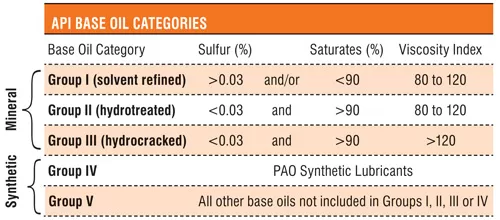
one google search to buy engine oil, and you will find yourself confused between “100% Synthetic” and “Full Synthetic” oils. Now you do not know if these are just marketing terms or there is really a difference?
The terms “100% Synthetic” and “Full Synthetic” are often used interchangeably in the automotive industry, but their definitions can vary depending on regulations and marketing strategies.
100% Synthetic Motor Oil consists entirely of synthetic base stocks, primarily Group IV (PAO) or Group V (esters), without conventional mineral oil content. These base oils are the most expensive base oils, and used for high-end oils and lubricants. High-performance vehicles and extreme driving conditions usually requires oils with extra protection, therefore, 100% Synthetic Oil are the best choice here.
Key benefits of 100% Synthetic Oil include:
Full Synthetic Oil often contains highly refined Group III base oils, which originate from mineral oil but undergo advanced hydrocracking to enhance their properties. In certain regions, including the U.S., Group III-based oils are legally classified as synthetic, even though they are not purely synthetic at a molecular level.
Some advantages of Full Synthetic Oil include:

Group 3 base oils are controversial group, they are both conventional base oils and synthetic base oils. Many big names in the industry consider them synthetic oil mainly because they are highly refined and almost feature similar properties to synthetic oil.
The classification of Group III oils as synthetic became widely accepted after a legal case in which Mobil challenged Castrol’s use of the term "synthetic" for Group III oils. The ruling allowed Group III oils to be marketed as synthetic, leading to broader adoption of the term "Full Synthetic" in the industry.
While both 100% Synthetic and Full Synthetic oils outperform conventional oils, those based on Group IV or V stocks generally offer higher purity and performance, especially under extreme conditions. For most vehicles, Full Synthetic Oil remains an excellent and cost-effective choice, delivering strong protection and efficiency.
Choosing between Full Synthetic Oil and 100% Synthetic Oil can be confusing due to the way these terms are used in the industry. Both offer superior protection compared to conventional oils, but their formulations differ in base oil composition and performance characteristics.
base oil groups and their applications in this informative blog post.
The lifespan of 100% Synthetic Oil depends on driving conditions, engine type, and manufacturer recommendations. Compared to conventional and full synthetic oils, 100% synthetic formulations offer longer drain intervals and superior engine protection.
Many high-performance 100% synthetic oils are designed for extended drain intervals, reducing maintenance frequency while maintaining engine cleanliness and efficiency.
Following the vehicle manufacturer's recommendations ensures optimal performance and longevity. Regular oil analysis can also help determine the best change interval based on your specific driving conditions.
While Fully Synthetic Oils offer superior engine protection and performance, there are some drawbacks to consider before making the switch. These factors may influence whether 100% Synthetic or Full Synthetic Oil is the best choice for your vehicle.
Fully synthetic oils are significantly more expensive than conventional or semi-synthetic oils, often costing two to four times as much. The advanced refining processes and high-quality base stocks contribute to this price difference. For budget-conscious drivers, this higher upfront cost can be a concern.
Vehicles manufactured before the 1990s may not be designed to handle synthetic oils. Fully Synthetic Oils have stronger detergent properties, which can dissolve built-up deposits that previously acted as seals, potentially causing oil leaks in older engines. Classic car owners should consult their manufacturer before switching.
The production of synthetic oils requires more energy and resources compared to conventional oils. While they last longer and reduce oil change frequency, their manufacturing process has a higher environmental impact due to increased refining and processing.
Synthetic base oils require carefully formulated additive packages to achieve optimal performance. If not properly blended, certain additives may separate, reducing the oil’s effectiveness. High-quality synthetic oils from trusted manufacturers use advanced formulations to prevent this issue.
The term "Fully Synthetic" is widely used in the lubricant industry, but it doesn't always mean the oil is made entirely from 100% synthetic base stocks. Some manufacturers use this label for oils formulated with Group III, Group IV, or Group V base oils, creating confusion for consumers.
Rather than avoiding "Fully Synthetic" oils entirely, it's better to check the oil’s formulation, industry certifications, and manufacturer specifications. High-quality Full Synthetic Oils with PAO or ester content can offer near-identical performance to 100% Synthetic Oil, making them a practical and cost-effective choice.
Choosing the right engine oil depends on you vehicle's specific needs and your budget. By understanding the key differences between full synthetic oil and 100% synthetic oil, you can make a right decision that benefits your engine's performance, protection and longevity. For top-quality engine oils tailored to diverse needs, consider Armor Lubricants, best engine oil manufacturer in the UAE.
